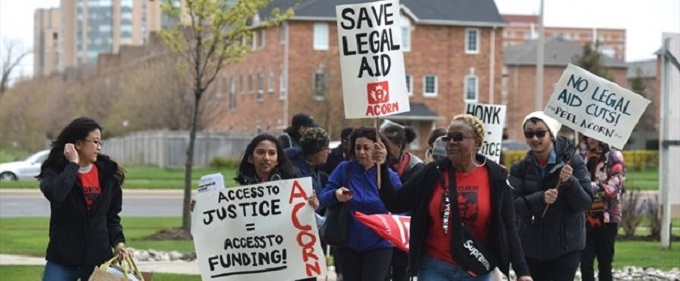Mississauga.com: ANALYSIS: Ford cuts to Legal Aid Ontario threaten assistance for low-income Peel residents
Posted May 28, 2019
LAO funding reduced by 30 per cent, retroactive to April 1
Posted May 28, 2019
Mississauga resident Joyce Tsagbey remembers “vividly” the July night she was served with court papers.
“I didn’t have the money or know where to turn to for legal help,” she said describing her ordeal.
Tsagbey sought help from Mississauga Community Legal Services — a community legal clinic under Legal Aid Ontario — on more than one occasion as she navigated through her legal issues involving disability pension, ODSP and housing.
“They were a source of comfort, a pillow for me to lay that heavy load,” she said in praise of the clinic. “Without the legal services, I wouldn’t be here talking to you.”
Tsagbey’s story is common with thousands of others, in Peel Region and beyond, who rely on Legal Aid Ontario — the provincial Crown corporation that provides legal assistance for low-income Ontarians.
LAO offers legal aid certificates that allow individuals to retain a lawyer, duty counsel services in Ontario courts and community legal clinics like Mississauga Community Legal Services (MCLS) and North Peel and Dufferin Community Legal Services (NPDCLS).
The Ford government’s 2019 budget revealed significant cuts to LAO, with its provincial allocation (the bulk of LAO’s budget) being reduced by 30 per cent or around $133 million, retroactive to April 1, 2019.
The agency’s anticipated $456 million for 2019-20 will now be $323 million as the cuts continue in coming years. Annual reductions are expected to reach 44 per cent by 2021.
Since the majority of the funding goes towards legal aid certificates, community legal clinics like those in Brampton and Mississauga will see at least a 16-per-cent reduction in financial support this year and potentially more each year following.
“I’ve been doing this work for decades and never faced a situation this dire,” NPDCLS executive director Jack Fleming said. “Eighty-six per cent of the cut is coming out of poor people.”
Fleming is referring to the percentage of the total cuts to the Ministry of the Attorney General’s budget. Of the total $154.3 million in cuts from the ministry this year, $133 million (86 per cent) is being slashed from Legal Aid Ontario.
A letter from Attorney General Caroline Mulroney to LAO CEO David Field claims the number of people served each year by LAO has declined from 2013-14 to 2017-18. She also adds “better accountability is required” based on the Auditor General’s 2018 report.
In that report, the Auditor General says from 2013-14 to 2017-18 the number of certificates issued by LAO increased by 23 per cent, the number of people assisted by duty counsel increased two per cent, and from 2013-14 to 2016-17, the number of community legal clinic files increased 12 per cent.
“They’re looking for efficiencies, but they fail to mention the legal aid audit,” MCLS executive director Doug Kwan said. “It shows that legal aid’s doing a good job.”
“Nowhere in the response does it ever say you need to cut the situation,” he added.
In the 15 recommendations outlined in the Auditor General’s report, none of them talk about cutting LAO’s budget. Instead, they recommend improved oversight of payments to private-sector lawyers and suggest the Ministry of the Attorney General work with the Ministry of Children, Community, and Social Services to reduce the number of ODSP cases, as an example, among other suggestions.
“Legal clinics can’t do much without cutting staff, that’s the bulk,” Fleming said.
North Peel and Dufferin serves Brampton, Caledon and Dufferin county with 10 lawyers, two paralegals, one ODSP case manager, one office manager and two client-service representatives requiring accreditation in social work.
Like MCLS, its cases involve housing, immigration and refugees, employment, family law and several cases involving mental health. Part of the cuts entirely remove the province’s allocation of funding for immigration and refugee cases — common in Brampton and Mississauga.
“In Peel, family law is a big one,” Kwan said. “Three quarters of certificates go to women, and half of those involve cases of domestic violence.”
Some residents have already responded to the announced cuts. Mississauga ACORN protested outside Mississauga Centre MPP Natalia Kusendova’s constituency office on May 9. Kusendova was at Queen’s Park at the time.
“In regards to the issues ACORN delivered to the office, my response is that I have received the letter and will forward it to the Ministry for review promptly,” Kusendova wrote in response to media requesting comment on the protest.
Kwan says Peel is already underfunded in the justice sector, including the community legal clinics.
“We’re already behind the eight ball,” he said. “It’ll impact Peel even worse.”
***
Article by Ali Raza for Mississauga.com

